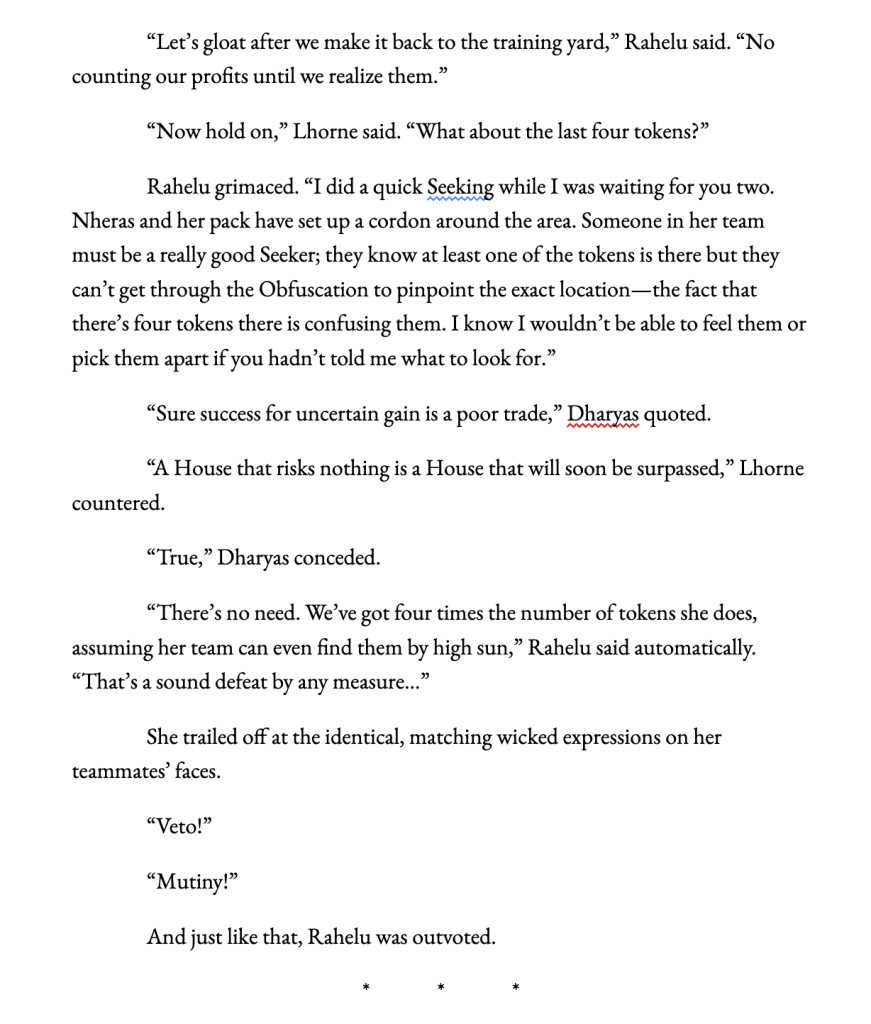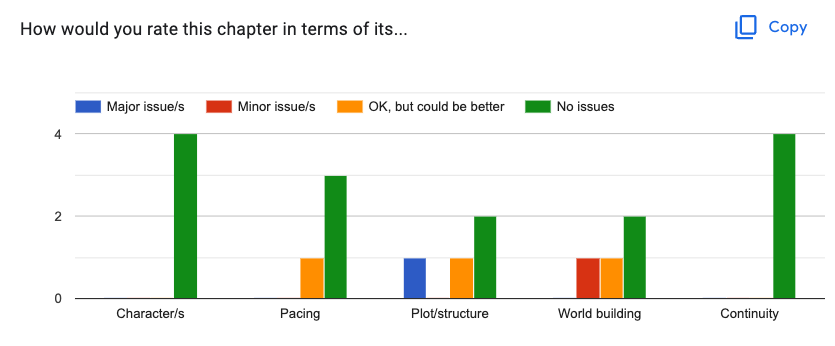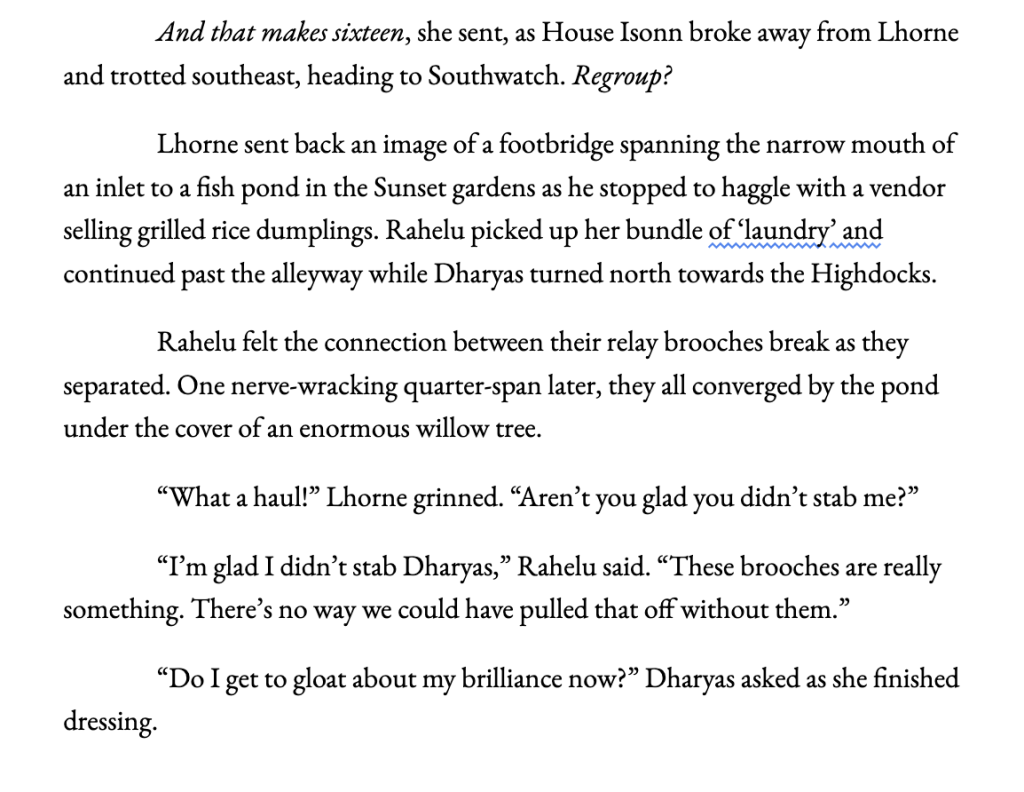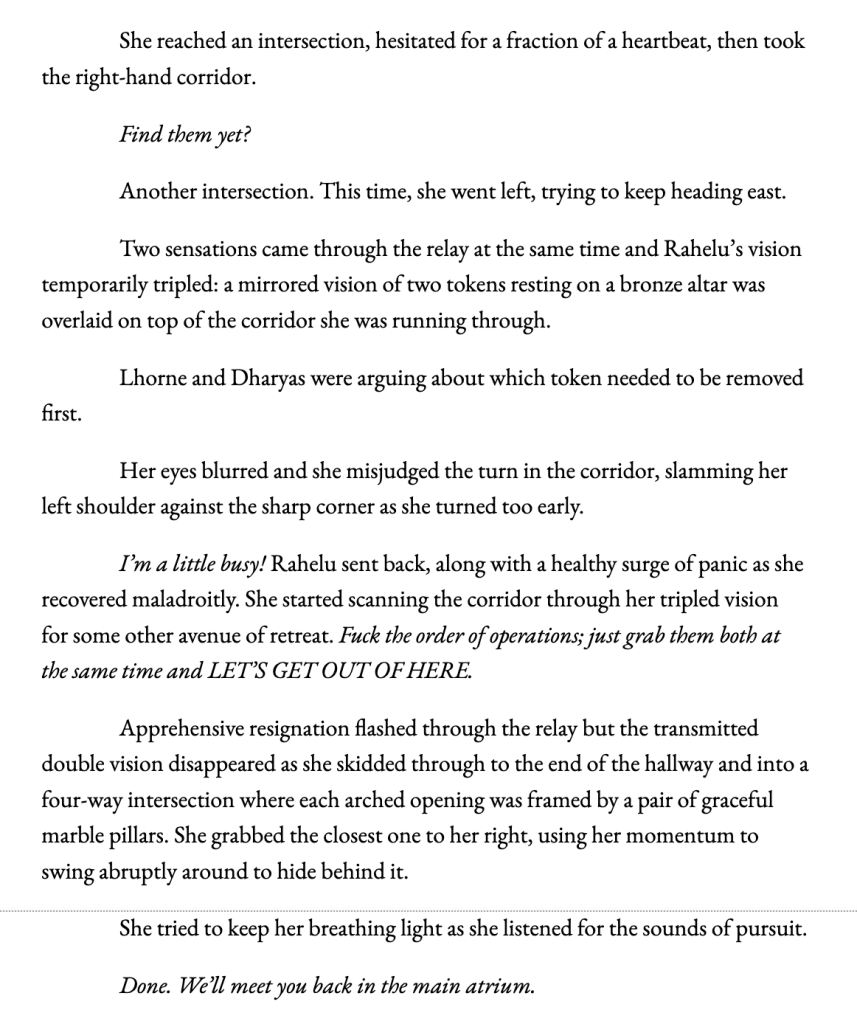The main problem I had created for myself with the first challenge is that while scavenger hunts can be fun to do, they are not fun to read. I’d also set myself up to have twenty tokens in play—thank goodness I came to my senses during revisions and whittled them down to ten.
I had a couple of options:
- Tell, don’t show: I could summarize part (or all) of the token search and skip to the next interesting part of the plot. Something like: “The first five tokens were easy to find” or “One span of non-stop running all over the city later secured their team all ten tokens”.
- Introduce conflict: Ideally in the form of some obstacle/s that Rahelu, Lhorne, and Dharyas have to overcome in order to get the tokens. This could be a plot-based or character-based. In my opinion, plot-based conflict is the easiest to come up with ideas for but harder to make interesting—you have to be very inventive or clever to keep things from feeling repetitive—whereas character-based conflict is harder to get right but also more compelling.
- Use the tokens as background detail to convey progress towards the overall goal: But that’s how we end up with 2,000 words that go like “They went to location A and found token 1, then they went to location B and found token 2…” and nobody wants to read that. I would need something else to take place as the focus otherwise it would just be boring description of Rahelu and her teammates wandering around the city.
In the end, I tried to do all of the above.
Conflict is the propulsion behind any plot; without it, all you have is an ordered sequence of events. So my number one priority is always to make sure there is some sort of conflict running through every scene. What’s awesome is when you can combine multiple conflicts.
Since I had already set up the final four tokens in one location, I knew that was going to be a single sub-objective and the big confrontation to end the narrative arc dealing with the first challenge begun in Chapter 6. This was relatively easy to make into a multi-layered conflict: we know Nheras and her cousins are applicants and Rahelu just spent three chapters clawing her way back into the Petitioning process after her defeat at Nheras’s hands; a more equal confrontation is in order. Both plot- and character-based conflicts converge when Rahelu tries to steal four tokens from right under Nheras’s nose—and succeeds. This is what makes the end of this sequence especially satisfying.
As I did not have six, distinct ideas with escalating stakes/tension, I simplified by grouping the early tokens together. Chapter 8 opens after a time skip on Rahelu and her team finding the last of those early tokens, then goes straight into a character-based conflict. This is what it looked like in the original draft (when they had just found sixteen out of the twenty tokens without any difficulty):

From there, we cut straight to the confrontation with Nheras and her team over the last four tokens. It worked…fine. At least, that’s how I interpreted this feedback from my beta readers:

But ‘fine’”‘ was not what I was going for. I didn’t want to see anything but green on that chart; I wanted ‘awesome’. I wasn’t sure that I could get there, but if I aim for ‘awesome’ and fall short, theoretically I should land somewhere between ‘good’ and ‘great’, right?
So I went back over the chapter and had a look at what I could do better. The first thing that struck me was the opening. There were 391 words of description that covered how everybody was dressed and an unnecessarily detailed blow-by-blow narration of them retrieving the hidden token—boring!—before we got this:

Buried in the middle of that section is a time skip—one that my beta readers rightly pointed out was a missed opportunity. Everything happens too easily for Rahelu and her team. We have no idea what the other teams are doing. This whole Petitioning business, which we’ve spent seven chapters hyping up to be a Big Deal, seems to be a walk in the park as far as this challenge goes.
One Clever Trick and the protagonist gets everything handed to her on a plate? I don’t think so! That’s certainly not consistent with the tone and story expectations I set up back in Chapter 1.
The first part of my solution was to cut down the opening and rework the first character-based conflict. I made it more internal to Rahelu and moved a bit of worldbuilding about the city here to foreshadow something that happens later in Chapter 12. It also builds on some of the introspection that happened earlier in the previous two chapters.
The second part was to follow the rule of three: I replaced the time skip by introducing a medium-stakes conflict in-between Rahelu’s angsting about her decision to listen to Lhorne and Dharyas and the higher-stakes action sequence with Nheras at the end of the arc.
The question was, what should this conflict be?
The answer in hindsight was pretty obvious: Elaram.
Elaram gets a decent amount of page time in the book but, for one reason or another, she doesn’t pull as much focus as the other characters later on. She’s also a very different character to the other House-born we’ve met: she doesn’t have the same ‘Mean Girls’ energy as Nheras, but she also doesn’t give off the same ‘Nice People’ vibes to Rahelu as Lhorne and Dharyas.
She’s also a lot of fun to write. I had every intention of keeping the expanded scene brief but, well—
(Three thousand, two hundred and fifty words later…)
Elaram is a lot of fun to write.
(This is how I set out writing a 75,000-word novel and end up with a 126,000-word draft.)
I did worry about whether Lhorne and Dharyas turning up right at the end feels a bit left field. In the end, I decided that it was okay: I’d set up the expectation that they were to meet up at the fishpond, Rahelu was wondering why they were delayed, and it was reasonable to explain their absence by having them go off to steal another token from Ghardon, Elaram’s brother. How, exactly, that all went down is just as much of a mystery to me as it is to Rahelu. I have no idea. I probably won’t know unless I write it and I don’t know if I ever will.
The last revision I made to this chapter was in the final scene. Again, it a scene that already worked because everybody is here to see Nheras get beat—Dharyas clubbing her on the head was actually the closing line in the chapter originally—but something felt lacking. I only realized quite late in the process that I had missed a pay-off.
In Chapter 7, Lhorne goes on and on about how important the order of operations is and how bad it would be if they messed it up. Then I did this:

All that obsessing over the order of operations to wind up with “Done” and a clean escape?
Nope. Not in my book!
“Oops” coupled with “We need to run” is, obviously, far better.
Leave a Reply